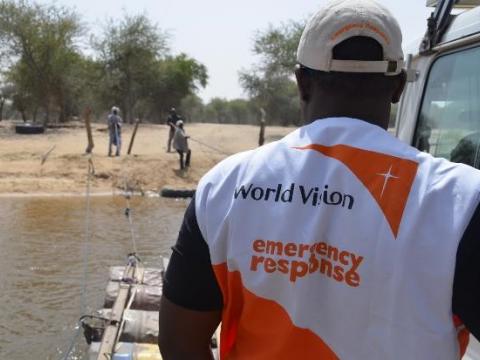Bringing Change Where No One Has Gone Before

By Francine Obura, Director of Communications for World Vision's West Africa Regional Office
“Since we fled for our lives, no-one was helping us – until World Vision came. Your soap, basin, cup, containers [were] the first aid we have received to support us. It is a relief!” says Mahamat Mallam
Mahamat Mallam, the leader of the refugees in Kitiri Blafo, a community of around 200 houses near Baga Sola in Chad, adds that his group hopes they will be able to settle down and rest in safety, now they have these tangible signs of hope.
“More than a year ago, we ran away from the Boko Haram militia’s criminal activities in a village bordering Nigeria,” he explains.
“From one day to another, we became displaced people in our own country, looking for places to settle.”
They ended up at Kitiri Blafo, “in the middle of nowhere”, but chose to stay because it was near the lake, and they could catch fish to eat.
Baga Sola city is less than 100 km away from the Nigerian border, where the Boko Haram fighters still bring violence and distress to vulnerable communities. It makes this a difficult place to work for the community and protect people from harm.
That explains why Mahamat and his group did not find humanitarian organisations queuing up to help them. But, as a World Vision staff member put it, “the common thing you will find everywhere here is need.” That creates an imperative for an organisation committed to seeking out vulnerable people in the most fragile situations.
It’s not just here in Baga Sola, either. Insecurity, poverty and the absence of development initiatives are exacerbating the current humanitarian crisis across the Lake Chad Basin.
More than 130,000 people have been displaced due to the insecurity. Half of children cannot go to school and most of the population needs food assistance - 18% of children are acutely malnourished. More than one third of the population does not have access to safe water and many of those who do are relying on open wells and water from the lake.
World Vision’s response team decided this was an opportunity to show the organisation’s commitment to “most-vulnerable” children. They set themselves the target of reaching out to displaced people in remote, insecure and difficult-to-reach places like Kitiri Blafo.
People like Mahamat can think they are forgotten by the rest of the world, said Boukary Gambo, World Vision’s Baga Sola Response Manager.
“We are especially focused on finding children who are not being reached by other aid organisations and who cannot access the formal refugee camps,’’ Boukary explains, noting that children tend to suffer the worst during displacements.
Life for Mahamat’s people looks more hopeful now. Some community members have done well with their fishing and are able to sell their catch at the nearest market, 10 kilometres away. Extra income is welcome, but there are still huge problems to face. There is no school, no health centre, no land suitable for farming, and no roads.
With funding from the Skala Foundation, provided through World Vision Germany, the Baga Sola team has drilled 15 boreholes. Added to 30 boreholes drilled in similar locations, they are providing water to more than 17,000 vulnerable people.
With safe water available, World Vision is providing 5,000 households with the materials necessary for hygienic washing and cleaning utensils. The next plan is to open four Child Friendly Spaces to provide safe play, counselling and education for vulnerable children.
Funding for the Lake Chad response is low, however. That makes every contribution all the more valuable, changing the lives of thousands of people and ensuring they are not forgotten.